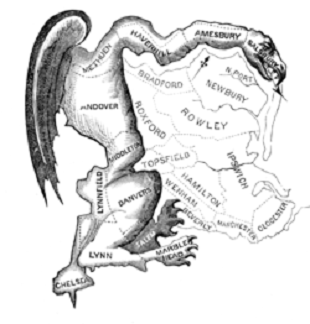Can redistricting be done fairly with the wide political divide we face?
There is a long history of
gerrymandering in drawing political districts. As the population shifts and grows, redistricting has become a political tool of the party in power.
Census counts are used to determine the allocation of seats in Congress, the number of electors in the Electoral College and hundreds of billion dollars of federal spending. It is also used to redistrict Oregon’s House and Senate districts.
On the national level,
President Trump signed an order to prevent illegal immigrants from being counted in redrawing of voting districts. The census currently does not either include a citizenship question, or a question about legal immigration status. The order says that for the purposes of reapportionment, "it is the policy of the United States to exclude from the apportionment base aliens who are not in a lawful immigration status.
"Today’s action to exclude illegal aliens from the apportionment base reflects a better understanding of the Constitution and is consistent with the principles of our representative democracy," Trump said. "Although the Constitution requires the persons in each State, excluding Indians not taxed, to be enumerated in the census, that requirement has never been understood to include in the apportionment base every individual physically present within a State's boundaries at the time of the census," the order says.

Oregon’s increased population would indicate an additional representative. However, President Trump’s memo to agencies says that states that enacted sanctuary laws to shield illegal aliens from capture by federal authorities, and that thwart the enforcement of federal laws should not be rewarded with increased representation in Congress. According to the memo, one state has an estimated 2.2 million illegal aliens, who, if counted in the apportionment, would give the state two or three additional congressional seats. Once the apportionment is calculated, the president will transmit the final determination to Congress.
What Oregon does with the numbers to redistrict has always been contentious. Oregon’s
Initiative 57, People Not Politicians, attempts to take politics out of the process by amending the Constitution to repeal legislative redistricting process and create a congressional/state redistricting commission with equal number of Democrats, Republicans, and others. The measure says, “Election Day is when Oregonians exercise their right to vote and make their voice heard, and the people of Oregon need an independent commission to draw fair and impartial districts so that every vote matters.â€
Gerrymandering is actively at work in automatic voter registrations and building low-income apartments aimed at conservative districts. Six states including California and Canada have appointed nonpartisan commissions to draw the redistricting maps. Oregon’s initiative goes a step further requiring equal representation, unlike the six states who often appoint ‘nonpartisan’ commissioners with partisan opinions. But they are still experiencing closer elections indicative of some merit.
Can taking census and redistricting be done fairly with the wide political divide we face? Leaving the process to legislators would be a definite ‘NO.’ But, passing Initiative 57 gives it a fighting chance.
--Donna Bleiler| Post Date: 2020-07-23 18:46:24 | Last Update: 2020-07-23 19:41:12 |







 Oregon’s increased population would indicate an additional representative. However, President Trump’s memo to agencies says that states that enacted sanctuary laws to shield illegal aliens from capture by federal authorities, and that thwart the enforcement of federal laws should not be rewarded with increased representation in Congress. According to the memo, one state has an estimated 2.2 million illegal aliens, who, if counted in the apportionment, would give the state two or three additional congressional seats. Once the apportionment is calculated, the president will transmit the final determination to Congress.
Oregon’s increased population would indicate an additional representative. However, President Trump’s memo to agencies says that states that enacted sanctuary laws to shield illegal aliens from capture by federal authorities, and that thwart the enforcement of federal laws should not be rewarded with increased representation in Congress. According to the memo, one state has an estimated 2.2 million illegal aliens, who, if counted in the apportionment, would give the state two or three additional congressional seats. Once the apportionment is calculated, the president will transmit the final determination to Congress.